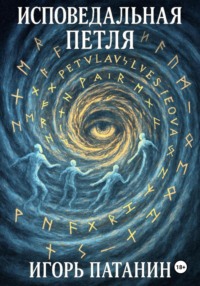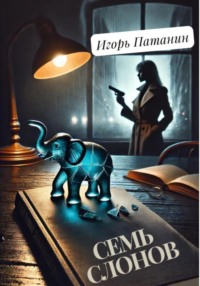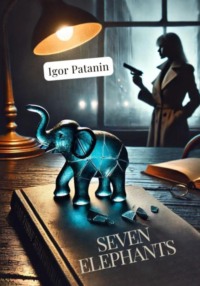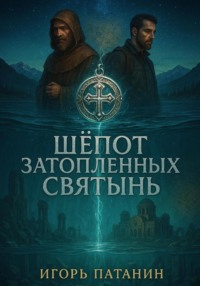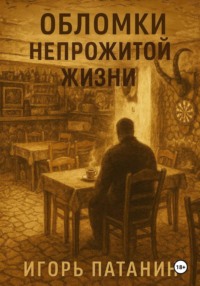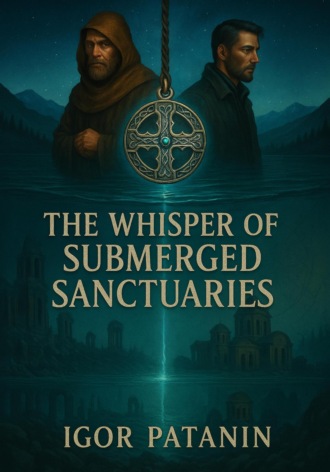
Полная версия
The Whisper of Submerged Sanctuaries
She turned off the lamp, and the grotto plunged into semi-darkness, illuminated only by moonlight filtering through the entrance. They made themselves as comfortable as possible on the narrow bench, pressing against each other for warmth. Nights in the mountains were cool even in summer.
"Thank you for coming to my aid," Alexei said quietly. "You could have simply refused when I called."
"I wanted to refuse," Dinara admitted. "But then I realized this might be my chance to learn the truth. About my grandfather, about the past… about everything."
"What truth?"
"I don't know. But all my life, I've had the feeling that there's some secret in our family. Grandfather never spoke of it directly, but sometimes, especially when he thought no one could hear him, he would whisper strange phrases. About light in water, about a key that would open a door… I thought it was just an old man's muttering. But now…"
She didn't finish the sentence, but Alexei understood. Now, with the appearance of the medallion, these strange phrases were beginning to make sense.
"We'll solve this mystery," he promised. "Together."
Dinara didn't answer, but in the darkness, her hand found his and squeezed it. And so they fell asleep—shoulder to shoulder, holding hands, under the protection of ancient rocks that held many secrets.
At some point during the night, Alexei had a strange dream. He stood on the shore of Issyk-Kul, and the water before him glowed from within, as if an enormous fire burned in its depths. From the water emerged the figure of a monk in dark clothing, who extended something shining toward him. Alexei wanted to move closer, but the water around the monk began to bubble and foam, forming a whirlpool. The monk shouted something Alexei couldn't understand and disappeared into the depths, and with him, the glow vanished as well.
Alexei awoke with a pounding heart. Beside him, Dinara breathed quietly, still holding his hand. Beyond the entrance to the grotto, dawn was breaking—the sky in the east was brightening, taking on a delicate pink hue. A new day was beginning, one that might bring them closer to unraveling the secret of the medallion and what it had protected for centuries.
Chapter 4: The Keeper of Secrets
Twilight descended on the mountain road as Bakyt's UAZ, having left behind the winding serpentine, entered a small valley. The last rays of the setting sun gilded the peaks of the surrounding mountains, but below, among gardens and low mud-brick houses, shadows were already deepening.
The vehicle bounced over countless potholes on the dirt road, raising clouds of dust from under its wheels. Alexei, who had been leaning tiredly against the door, straightened up when the first houses of the village appeared among the trees.
"My father, Rustam, lives in this village," said Ermek.
"Does he know we're coming?" asked Alexei.
"Of course," Ermek nodded. "I contacted him by radio while you were hiding in the grotto. He's expecting us."
Alexei looked at Dinara, who was silently gazing out the window. Her face revealed impatience and anxiety. Evidently, meeting her grandfather was an important event for her, but thoughts of pursuit and danger gave her no peace.
The UAZ drove along the main street of the village, raising dust and attracting the attention of the few pedestrians and dogs dozing in the evening shadows. It was a typical Kyrgyz village—single-story houses surrounded by high mud-brick walls, behind which the crowns of fruit trees were visible, occasional small shops, and a small mosque with a low minaret.
"Life here flows almost the same as it did a hundred years ago," Ermek remarked. "Of course, there's electricity, televisions, mobile phones. But the foundation remains the same—the land, the mountains, traditions passed down from generation to generation."
The car turned toward the outskirts of the village and stopped in front of a mud-brick fence painted blue. Bakyt cut the engine, and the sudden silence, broken only by the distant barking of dogs and bleating of sheep, seemed deafening after the long journey.
"We've arrived," announced Ermek, opening the door. "Welcome to my father's house."
They got out of the car. A tall elderly man in a traditional Kyrgyz kolpak—a conical white hat with an ornamental design—was already waiting for them at the gate. Despite his age, Rustam Kambarov looked fit and robust. He had a swarthy face with deep wrinkles, penetrating dark eyes, and a neatly trimmed gray beard. He held a carved walking stick in his hand but leaned on it lightly, more for convenience than necessity.
"Grandfather!" Dinara ran to him and embraced him.
"Kenzhem, my little one," the old man smiled, hugging his granddaughter. "How glad I am to see you."
Then he turned his attention to Ermek and warmly embraced his son. Finally, his gaze settled on Alexei. Something in that gaze—attentive, scrutinizing, as if looking into the very soul—made Alexei feel uncomfortable.
"And you must be Igor Nikolaevich's grandson," said Rustam, extending his hand. "I see his features in your face. The same eyes, the same chin."
"Alexei Sorin," Alexei introduced himself, shaking the old man's dry but firm hand. "Very pleased to meet you, Rustam-aga."
"You knew my grandfather?" he asked, surprised by how accurately Rustam had identified his relationship.
"Oh yes," the old man nodded. "Igor Nikolaevich was a good man. Honest. A true friend." He gestured for everyone to enter the courtyard. "But we'll talk about that over dinner. You must be tired and hungry from your journey."
They entered a spacious courtyard where a table had been set under a canopy of grapevines. A plump middle-aged woman in a traditional dress and headscarf was busy with preparations.
"This is Aigul, my helper," Rustam introduced her. "She has been taking care of me since my wife, Dinara's grandmother, passed away ten years ago."
Aigul nodded warmly to the guests and returned to her tasks. Bakyt, saying goodbye, left on his own business, promising to return in the morning.
They sat down at the table, which was already laden with traditional Kyrgyz dishes—beshbarmak, manty, boorsok, kurut, jam, and, of course, apples and peaches grown in Rustam's garden. The old man poured strong black tea into bowls.
"Eat, drink," he invited. "Help yourselves to everything God has provided."
During dinner, the conversation revolved around everyday matters—life in the village, harvest prospects, relatives' health. Rustam asked Dinara about her work at the museum and Alexei about life in St. Petersburg. It seemed the old man deliberately avoided the topic of the medallion and the pursuit, as if waiting for the right moment.
When the meal was finished and Aigul had cleared the table, serving fresh tea, Rustam finally got down to business.
"Ermek told me by radio about what happened," he said, looking intently at Alexei. "About the medallion, about Karabaev's men." He shook his head. "I knew this day would come. I've been preparing for it for many years. But it still caught me off guard."
"What do you mean?" asked Alexei. "What day?"
"The day when the medallion would return to Issyk-Kul," Rustam replied. "The day when the final chapter of a story that has lasted eight centuries would begin."
Alexei felt the medallion on his neck seem to respond to these words—becoming warmer, heavier. He took it out from under his shirt and placed it on the table in front of Rustam.
The old man did not touch the medallion but looked at it with reverence mixed with anxiety.
"So it is indeed the one," Rustam said quietly. "The very one your grandfather found in 1954 and then hid from everyone."
"You knew about my grandfather's find?" Alexei asked in surprise.
"Of course," Rustam nodded. "I was there when Igor found it in the cave. I was twelve years old, helping the expedition as a guide. I saw how the medallion first glowed in his hands."
"Glowed?" Alexei repeated. "You mean… literally?"
"Exactly," Rustam confirmed. "The silver began to emit a bluish glow when Igor took it in his hands. The expedition leader, Voronov, attributed it to some optical effect, a reflection of light from minerals in the cave. But Igor and I knew it was something more."
The old man sipped his tea and continued:
"After that, your grandfather began asking me questions about local legends, about the Nestorians, about sunken treasures. I told him what I knew from the stories of my father and grandfather. And then Igor decided to conceal the find from the expedition leadership."
"Why?" asked Dinara. "Usually archaeologists strive to register every find."
"Because Igor understood that the medallion was not just an ancient artifact," Rustam answered. "It's a key to something much more important. To a secret that had been kept for centuries. And this secret should not have fallen into the hands of the Soviet authorities, especially at that time—the height of the Cold War, spy mania, KGB everywhere…"
Rustam rose and went to a shelf where books and old photographs were kept. He retrieved a worn leather book tied with a cord.
"This is a family heirloom," he said, returning to the table. "The diary of my distant ancestor, Murat Kambarov. He was a shaman and healer. People from all over the valley came to him for advice and help. He began helping people after a man once came to him who changed our family's history."
Rustam untied the cord and carefully opened the book. The pages were yellowed, with handwritten text in old Kyrgyz, faded in places.
"It says here," Rustam began, slowly translating, "that in 1273, an old man named David came to my ancestor. He was very old, with a beard as white as snow, but his eyes were clear and lively. He spoke in a strange mixture of languages and wore a silver cross on his chest. The old man said he had come from afar to pass on important knowledge to one worthy of keeping it."
Rustam turned the page.
"David said he was the last keeper of an ancient secret. His teacher, a European monk named Thomas, had entrusted him with preserving knowledge about a Nestorian treasure hidden during the Mongol invasion. Among the treasures was a special item that David called the 'Key of Solomon'—a crystal with extraordinary properties."
"A crystal?" Alexei asked. "Not the medallion?"
"The medallion is a pointer, a guide to the crystal," Rustam explained. "The real 'Key of Solomon' is a crystal hidden in a cache." He continued translating: "David was too old to keep the secret himself. He gave my ancestor a map indicating the place where the treasures were hidden and said that someday a person would come who could find and use the 'Key of Solomon' for good. Until then, the secret must remain hidden."
"And where is this map now?" asked Alexei.
"Lost," Rustam replied regretfully. "During the civil war, our house was burned down, and many family heirlooms disappeared. Only this diary remained, which my grandfather managed to hide." He closed the book. "But even without the map, I know where to look. Our ancestor passed this knowledge to his son, who passed it to his son, and so on from generation to generation. Thus the secret came down to my father, and my father passed it to me."
"And you never tried to find the treasures yourself?" asked Dinara.
"I tried, when I was young and hot-headed," Rustam smiled. "But my ancestor left a warning: without the medallion, finding the cache is impossible. And the medallion was lost in David's time." The old man looked at Alexei. "At least, that's what we thought until your grandfather found it in 1954."
"But why didn't my grandfather use the medallion to find the treasures?" Alexei wondered. "Why did he simply hide it and tell no one?"
"Because it was a dangerous time," Rustam answered. "The USSR, the Cold War, the KGB watching every step. Igor understood that if the authorities learned about the 'Key of Solomon,' they would do everything to get it. And if the legend is to be believed, this crystal possesses extraordinary power. In the hands of those who crave power, it could become a dangerous weapon."
"What kind of power exactly?" asked Alexei.
Rustam smiled mysteriously.
"They say the crystal can heal diseases, prolong life, and even open the 'eyes of the soul,' allowing one to see the true nature of people and things. But there is also a warning: it amplifies both the light and dark sides of human nature. In the hands of a good person, it works miracles. In the hands of an evil one—it brings calamity."
"Sounds like a myth," Alexei remarked.
"Perhaps," Rustam agreed. "But your grandfather, a scientist and skeptic, believed in this legend enough to keep the medallion secret all his life. That makes one think, doesn't it?"
Dinara looked at the medallion lying on the table.
"What about these symbols?" she asked, pointing to the strange marks on the reverse side of the medallion. "What do they mean?"
"It's a combination of Nestorian script and special symbols known only to initiates," Rustam replied. "A kind of cipher. But I cannot read it completely. My father couldn't either. That part of the knowledge was lost."
"And the inscription inside?" asked Alexei. "'Lux in aqua, aqua in luce. Clavis Salomonis aperiet viam.' Light in water, water in light. Solomon's key will open the way."
"That's a clue," said Rustam. "Light in water, water in light' is a description of a special phenomenon that can be observed only at a certain time of year and in a specific place on Issyk-Kul. When the sun rises and its first rays penetrate the water at a particular angle, creating the illusion that the lake is glowing from within. And at that moment, an entrance to a cave, hidden at other times, becomes visible."
"Is such a thing possible?" Alexei asked doubtfully. "A cave entrance that's visible only under special lighting?"
"There are many unusual things at Issyk-Kul," Rustam replied. "But in this case, we're talking about a natural phenomenon. The entrance is located in a cliff and under normal lighting blends with the surrounding rocks. But when light falls at a certain angle, it creates a contrast that makes the entrance visible."
"And when does this happen?" Alexei inquired.
"Once a year, on the summer solstice," said Rustam. "Which, by the way, will occur in a few days."
Alexei and Dinara exchanged glances. What a coincidence. Or was it fate?
"So if we want to find the 'Key of Solomon,' we only have a few days?" Dinara clarified.
"Exactly," Rustam nodded. "But there's a more serious problem than the timing." His expression darkened. "Karabaev. That man is obsessed with finding Nestorian treasures. For years, he's been gathering information, financing expeditions, bribing officials. And now that he's learned about the medallion, he'll stop at nothing to get it."
"But how did he find out?" asked Dinara. "We were careful."
"In our time, it's difficult to keep secrets," Rustam sighed. "Especially from a man with such resources and connections. Perhaps someone at the museum told him about your conversation. Or they found mention of the medallion in Igor's papers in the university archive."
Ermek, who had been listening silently to the conversation, spoke up:
"Whatever happened, we must get ahead of Karabaev. Find the 'Key of Solomon' before he does."
"I agree," Rustam nodded. "But we need to be extremely cautious. Right now, his men are probably combing the area looking for us."
"Do you have a specific plan?" asked Alexei.
"Yes," Rustam replied. "Tomorrow at dawn, we'll go to where your grandfather found the medallion. It's a cave complex in the mountains not far from Kurmenty. There we'll find clues that will help us determine the exact location of the entrance mentioned in the legend."
"But won't Karabaev's men be watching these caves?" Dinara questioned.
"Surely," Rustam agreed. "But there are old paths known only to locals. We'll take those. Plus, we have an advantage—the medallion. Without it, Karabaev will never find the entrance, no matter how many men he sends."
Alexei picked up the medallion from the table and looked at it pensively. In the light of the kerosene lamp (Rustam principally did not use electric lighting in the evenings, preferring "living fire"), the silver gleamed dully, and the strange symbols seemed to come alive, moving in the play of shadows.
"Do you really believe that this crystal, the 'Key of Solomon,' possesses such power?" he asked Rustam.
The old man looked at him for a long time before answering.
"I've lived a long life, Alexei. I've seen many strange and inexplicable things. Especially here, at Issyk-Kul." He paused. "I cannot say with certainty that the crystal possesses all the properties mentioned in the legend. But there is something special about it. Something that made the Nestorians hide it from the world. Something that made your grandfather keep the secret all his life." He looked Alexei directly in the eyes. "And something that makes Karabaev so desperately search for it."
Silence fell in the room. Only the wick in the lamp crackled and night sounds came from the garden—the chirping of crickets, the rustle of leaves, occasionally the hooting of an owl.
"Now you need to rest," said Rustam, rising. "Tomorrow will be a difficult day. Aigul will show you to your rooms."
They followed Aigul, who led Dinara to one room and Alexei to another. The room was small but cozy, with a low bed, a small table by the window, and a chest for belongings. On the walls hung traditional Kyrgyz carpets—shyrdaks—with bright geometric patterns woven from rich red and blue threads, preserving ancient symbols and stories of the nomadic people, behind which the breath of high-mountain steppes seemed to hide.
Alexei sat on the bed, still holding the medallion in his hand. The events of the past few days swirled in his head, forming an incredible story—an ancient treasure, a mysterious crystal with mystical properties, a chase, danger… It seemed he had fallen into an adventure novel or film.
He put the medallion back around his neck and hid it under his shirt. The medallion responded with familiar warmth, as if happy to return to its place.
Alexei went to the window. Beyond it stretched a garden illuminated by the full moon—silvery apple trees, pears, apricots. And further—the dark silhouettes of mountains and the shimmering surface of Issyk-Kul, reflecting the stars.
There, in those mountains and under those waters, lay hidden a secret that generations had kept. A secret to which the medallion was the key. And in three days, they would have a chance to uncover it.
If, of course, Karabaev didn't get to it first.
A knock at the door interrupted his thoughts.
"Come in," he said.
Dinara entered the room. She had changed into simple home clothes and let her hair down. In the dimness of the room, her eyes seemed especially dark and deep.
"Can't sleep?" she asked, sitting on the chair by the table.
"Too much information for one day," Alexei replied, returning to the bed. "It all seems… unreal."
"I know," Dinara nodded. "Even for me, having grown up with these legends, everything that's happening feels like a dream. Or a movie."
"Do you really believe this story?" asked Alexei. "About a crystal with unusual properties?"
Dinara pondered before answering:
"I'm a historian. I was taught to rely on facts, on documents, on archaeological finds. But I also grew up here, among these mountains and legends." She looked out the window at the starry sky. "There are things that science cannot yet explain. Especially here, at Issyk-Kul. The lake holds many secrets." She turned to Alexei. "And you? Do you believe?"
Alexei touched the medallion under his shirt. It was warm again, almost alive to the touch.
"A week ago, I would have definitely said 'no,'" he answered honestly. "But now… after everything that's happened… I don't know. This medallion behaves strangely. And people are willing to kill for it. So there must be something to this story."
Dinara nodded.
"That's why we must find the crystal before Karabaev. If the legend is even partially true, in his hands, the 'Key of Solomon' could become a dangerous weapon."
"Or the greatest blessing for humanity, if one believes in its healing properties," Alexei remarked.
"It all depends on the person who possesses it," said Dinara. "At least, that's what the legend says."
She rose, preparing to leave.
"We need to get some sleep. Tomorrow will be a difficult day."
At the door, she stopped and turned back:
"I'm glad you're here, Alexei. Despite all the dangers… I'm glad we're together again. Good night."
"Good night," he replied, watching her leave.
After Dinara closed the door, Alexei sat motionless for some time. Then he took off the medallion and placed it on the table by the bed. The silver disc gleamed dully in the moonlight streaming through the window. The symbols on its surface seemed to form mysterious patterns that were impossible to read but somehow felt familiar, like a long-forgotten dream.
Tomorrow. Tomorrow they would set out in search of the secret that the medallion had guarded. A secret that could forever change their lives.
With this thought, Alexei went to bed. He dreamed of mountains, caves, a lake glowing from within with a bluish light. And the figure of a monk standing on the shore with outstretched hands, as if offering something or warning about something. The monk was saying something, but Alexei couldn't make out his words. Only the medallion on the monk's chest glowed, and this light was the only guide in the surrounding darkness.
Chapter 5: The First Loss
Twilight quickly gave way to impenetrable darkness. In Rustam's house, everyone had long since gone to bed; only from a small window on the second floor did the faint light of a kerosene lamp filter through—Ermek was reviewing old maps of the area, trying to find the safest route to the caves.
Alexei awoke to the sensation that the medallion on his chest was vibrating. It didn't feel like anything natural—the silver disc was pulsating as if trying to warn him. He sat up in bed and listened. Outside, silence reigned—no familiar chirping of crickets, no rustle of leaves. A strange, tense silence.
He rose silently and approached the window. Moonlight flooded the garden, transforming the apple trees into bizarre silver sculptures. At first glance, everything seemed calm, but intuition told him something was wrong.
At that moment, Alexei noticed movement by the fence—a shadow gliding between the trees. Then another, from the opposite side of the garden. They were moving deliberately, surrounding the house.
Without wasting a second, Alexei ran out of his room. In the hallway, he collided with Dinara.
"They're here," he whispered. "The house is surrounded."
Fear flashed in her eyes, but she quickly composed herself.
"Wake Ermek," she said. "I'll warn grandfather."
Alexei nodded and headed for Ermek's room. But before he could take three steps, the sound of breaking glass came from outside, followed by a muffled explosion. The house filled with acrid smoke.
"Flash-bang grenade!" Alexei shouted. "To the exit!"
He grabbed Dinara's hand and pulled her toward the stairs. At that moment, the front door crashed off its hinges, and dark figures in masks and with weapons burst into the house.
"Upstairs!" Alexei commanded, changing direction.
They ran up the stairs just as Ermek rushed out of his room with a hunting rifle in his hands.
"Through the window, to the garden!" he shouted. "I'll hold them off!"
"No, Uncle!" Dinara exclaimed. "They'll kill you!"
"Do as I say!" Ermek snapped, taking position at the stairs. "Grandfather is in the far room, take him and leave through the western window. There's an apple tree there; you can climb down it."
Alexei pulled Dinara to Rustam's room. The old man was already on his feet, dressed, with a small leather pouch in his hands. His calmness in this situation was astonishing.
"They've come for the medallion," Rustam said, looking Alexei in the eyes. "Karabaev will stop at nothing."
From below came a gunshot, then shouts and sounds of struggle.
"We must hurry," Rustam approached the window and opened it. "Dinara, you go first. Help me climb down, and then Alexei should jump."


